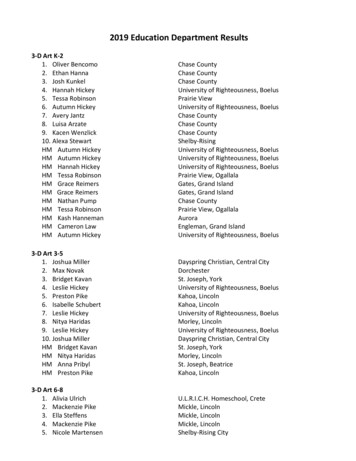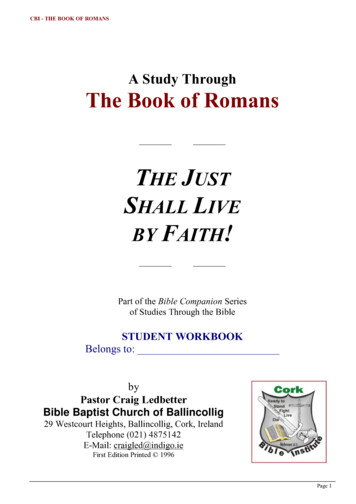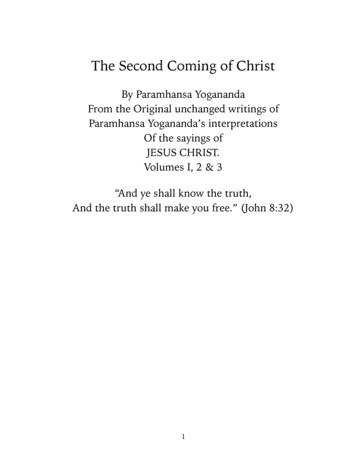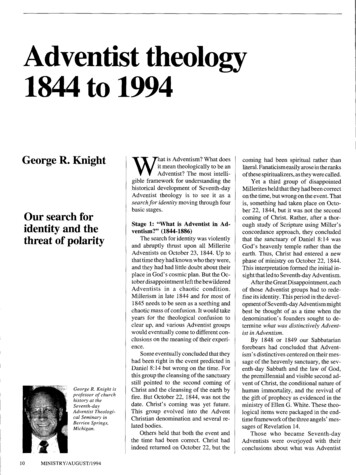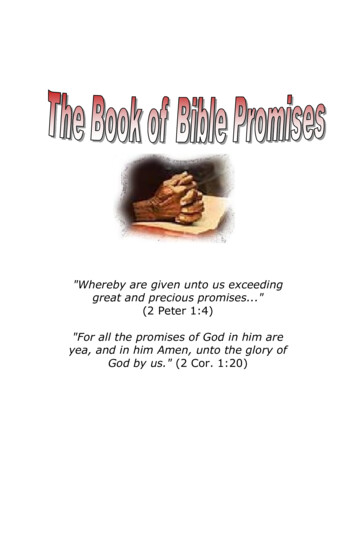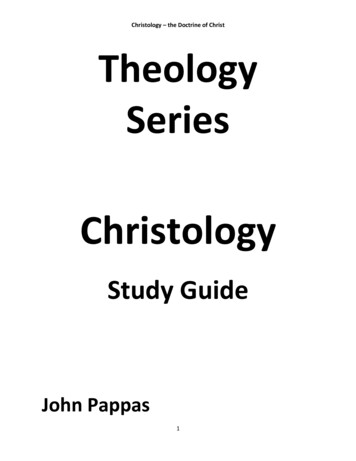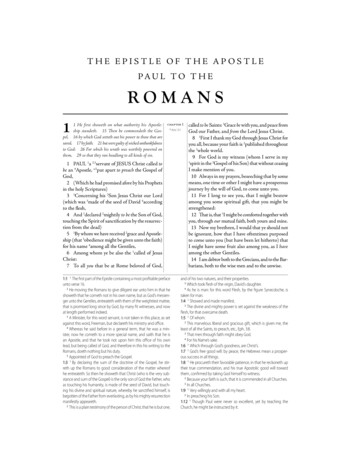
Transcription
[0]ChristandHis RighteousnessByE.J. Waggoner
[1]PUBLISHER’S PREFACEEllen G. White wrote shortly after theGeneral Conference session in 1888, "TheLord in His great mercy sent a most preciousmessage to His people through EldersWaggoner and Jones." Testimonies toMinisters, p. 91.It is generally conceded there were norecords kept of the studies which EldersWaggoner and Jones gave at this meeting.Christ and His Righteousness was publishedin 1902 in Melbourne, Australia, by a nonAdventist publishing house. We are issuingthis facsimile edition as a service to studentswho wish to study the message which Godsent to our church at the close of the lastcentury.
[2]AFacsimile ReproductionbyDestiny Press*309 Chevallum Road,Palmwoods,Queensland, Australia1978*[Destiny Press has been dissolved. See the address below for this book.]Pathway Publishers2757 County Road 3590Clarksville, AR 72830[479] 754-3001U.S.A.
[3]CONTENTS.How Shall We Consider Christ. 8Is Christ God . 9Christ as Creator . 16Is Christ a Created Being . 19God Manifested in the Flesh . 24Important Practical Lessons. 31Christ the Lawgiver. 39The Righteousness of God . 46The Lord Our Righteousness . 57Acceptance with God. 69The Victory of Faith. 78Bond-servants and Freemen. 85Practical Illustrations of Deliverance from Bondage. 88
[4]CHRISTANDHISRIGHTEOUSNESS.By E. J. Waggoner"And this is his name whereby she shall be called, THE LORD OURRIGHTEOUSNESS." Jer. 23:6."But of Him are ye in Christ Jesus, who of God is made unto us wisdom,and righteousness, and sanctification, and redemption." 1 Cor. 1:30.Melbourne:ECHO PUBLISHING COMPANY, Ltd.,Printers and Publishers,
263 COLLINS STREET, and BEST STREET, NORTH FITZROY.1892.
[5]ChristAndHis Righteousness.In the first verse of the third chapter of Hebrews we havean exhortation which comprehends all the injunctions givento the Christian. It is this: "Wherefore, holy brethren,partakers of the heavenly calling, consider the Apostle andHigh Priest of our profession, Christ Jesus." To do this asthe Bible enjoins, to consider Christ continually andintelligently, just as He is, will transform one into a perfectChristian, for "by beholding we become changed."1Ministers of the Gospel have an inspired warrant forkeeping the theme, Christ, continually before the people,and directing the attention of the people to Him alone. Paulsaid to the Corinthians, "I determined not to know anythingamong you, save Jesus Christ, and him crucified" (1 Cor.2:2); and there is no reason to suppose that his preaching tothe Corinthians was different in any respect from hispreaching elsewhere. Indeed, he tells us that when Godrevealed His Son in him, it was that he [6] might preachHim among the heathen (Gal. 1:15, 16); and his joy wasthat to him grace had been given to "preach among theGentiles the unsearchable riches of Christ." Eph. 3:8.But the fact that the apostles made Christ the burden ofall their preaching, is not our sole warrant for magnifyingHim. His Name is the only name under heaven givenamong men whereby we can be saved. Acts 4:12. ChristHimself declared that no man can come unto the Father butby Him. John 14:6. To Nicodemus He said: "And as Moseslifted up the serpent in the wilderness, even so must the Son
Christ And His Righteousness.of Man be lifted up; that whosoever believeth in Himshould not perish, but have eternal life." John 3:14, 15. This"lifting up" of Jesus, while it has primary reference to Hiscrucifixion, embraces more than the mere historical fact; itmeans that Christ must be "lifted up" by all who believe inHim, as the crucified Redeemer, whose grace and glory aresufficient to supply the world's greatest need; it means thatHe should be "lifted up" in all His exceeding loveliness andpower as "God with us," that His Divine attractiveness maythus draw all unto Him. See John 12:32.The exhortation to consider Jesus, and also the reasontherefore,2 are given in Heb. 12:1-3: "Wherefore seeing wealso are compassed about with so great a cloud ofwitnesses, let us lay aside every weight, and the sin whichdoth so easily beset us, and let us run with patience the racethat is set be- [7] fore us, looking unto Jesus the Authorand Finisher of our faith; who for the joy that was setbefore Him endured the cross, despising the shame, and isset down at the right hand of the throne of God. Forconsider Him that endured such contradiction of sinnersagainst Himself, lest ye be wearied and faint in yourminds." It is only by constantly and prayerfully consideringJesus as He is revealed in the Bible, that we can keep frombecoming weary in well-doing, and from fainting by theway.Again, we should consider Jesus because in Him "arehid all the treasures of wisdom and knowledge." Col. 2:3.Whoever lacks wisdom is directed to ask of God, whogives to all men liberally and upbraids not, and the promiseis that it shall be given him;3 but the desired wisdom can beobtained only in Christ. The wisdom which does notproceed from Christ, and which does not as a consequencelead to Him, is only foolishness; for God, as the Source ofall things, is the Author of wisdom; ignorance of God is theworst sort of foolishness (see Rom. 1:21, 22); and all thetreasures of wisdom and knowledge are hid in Christ; sothat he who has only the wisdom of this world knows, in
Christ And His Righteousness.reality, nothing. And since all power in heaven and in earthis given to Christ, the apostle Paul declares Christ to be"the power of God and the wisdom of God." 1 Cor. 1:24.There is one text, however, which briefly sums up allthat Christ is to man, and gives the most[8]comprehensive reason for considering Him. It is this: "Butof Him are ye in Christ Jesus, who of God is made unto uswisdom, and righteousness, and sanctification, andredemption." 1 Cor. 1:30. We are ignorant, wicked, lost;Christ is to us wisdom, righteousness, redemption. What arange! From ignorance and sin to righteousness andredemption. Man's highest aspiration or need cannot reachoutside the bounds of what Christ is to us, and what Healone is to us. Sufficient reason this why the eyes of allshould be fixed upon Him.HOW SHALL WE CONSIDER CHRIST?But how should we consider Christ?—Just as He hasrevealed Himself to the world; according to the witnesswhich He bore concerning Himself. In that marvelousdiscourse recorded in the fifth chapter of John, Jesus said:"For as the Father raiseth up the dead, and quickeneththem; even so the Son quickeneth whom He will. For theFather judgeth no man, but hath committed all judgmentunto the Son; that all men should honor the Son, even asthey honor the Father. He that honoreth not the Sonhonoreth not the Father which hath sent Him." Verses 2123.To Christ is committed the highest prerogative, that ofjudging. He must receive the same honor that is due toGod, and for the reason that He is God. The beloveddisciple bears this witness: "In the beginning was the Word,and the Word was [9] with God, and the Word was God."John 1:1. That this Divine Word is none other than JesusChrist is shown by verse 14: "And the Word was madeflesh, and dwelt among us (and we beheld His glory, the
Christ And His Righteousness.glory as of the Only-begotten of the Father), full of graceand truth."The Word was "in the beginning." The mind of mancannot grasp the ages that are spanned in this phrase. It isnot given to men to know when or how the Son wasbegotten; but we know that He was the Divine Word, notsimply before He came to this earth to die, but even beforethe world was created. Just before His crucifixion Heprayed, "And now, O Father, glorify thou Me with Thineown self with the glory which I had with Thee before theworld was." John 17:5. And more than seven hundred yearsbefore His first advent, His coming was thus foretold by theword of inspiration: "But thou, Bethlehem Ephratah,though thou be little among the thousands of Judah, yet outof thee shall He come forth unto Me that is to be ruler inIsrael; whose goings forth have been from of old, from thedays of eternity." Micah 5:2, margin. We know that Christ"proceeded forth and came from God" (John 8:42), but itwas so far back in the ages of eternity as to be far beyondthe grasp of the mind of man.IS CHRIST GOD?In many places in the Bible Christ is called God. ThePsalmist says: "The mighty God, even the [10] Lord[Jehovah], hath spoken, and called the earth from the risingof the sun unto the going down thereof. Out of Zion, theperfection of beauty, God hath shined. Our God shall come,and shall not keep silence; a fire shall devour before Him,and it shall be very tempestuous round about Him. He shallcall to the heavens from above, and to the earth, that Hemay judge His people. Gather My saints together unto Me;those that have made a covenant with Me by sacrifice. Andthe heavens shall declare His righteousness; for God isjudge Himself." Ps. 50:1-6.That this passage has reference to Christ may be known(1) by the fact already learned, that all judgment is
Christ And His Righteousness.committed to the Son; and (2) by the fact that it is at thesecond coming of Christ that He sends His angels to gathertogether His elect from the four winds. Matt. 24:31. "OurGod shall come, and shall not keep silence." No; for whenthe Lord Himself descends from heaven, it will be "with ashout, with the voice of the archangel, and with the trumpof God." 1 Thess. 4:16. This shout will be the voice of theSon of God, which will be heard by all that are in theirgraves, and which will cause them to come forth. John5:28, 29. With the living righteous they will be caught up tomeet the Lord in the air, ever more to be with Him; and thiswill constitute "our gathering together unto Him." 2 Thess.2:1. Compare Ps. 50:5; Matt. 24:31, and 1 Thess. 4:16.[11]"A fire shall devour before Him, and it shall be verytempestuous round about Him;" for when the Lord Jesusshall be revealed from heaven with His mighty angels, itwill be "in flaming fire taking vengeance on them thatknow not God, and that obey not the Gospel of our LordJesus Christ." 2 Thess. 1:8. So we know that Ps. 50:1-6 is avivid description of the second coming of Christ for thesalvation of His people. When He comes it will be as "themighty God." Compare Habakkuk 3.This is one of His rightful titles. Long before Christ'sfirst advent, the prophet Isaiah spoke these words ofcomfort to Israel: "For unto us a Child is born, unto us aSon is given; and the government shall be upon Hisshoulder; and His name shall be called Wonderful,Counselor, the mighty God, the everlasting Father, thePrince of Peace." Isa. 9:6.These are not simply the words of Isaiah; they are thewords of the Spirit of God. God has, in direct address to theSon, called Him by the same title. In Ps. 45:6 we read thesewords: "Thy throne, O God, is forever and ever; the scepterof Thy kingdom is a right scepter." The casual reader mighttake this to be simply the Psalmist's ascription of praise toGod; but when we turn to the New Testament, we find that
Christ And His Righteousness.it is much more. We find that God the Father is the speaker,and that He is addressing the Son, calling Him God. SeeHeb. 1:1-8.This name was not given to Christ in conse- [12] quenceof some great achievement, but it is His by right ofinheritance. Speaking of the power and greatness of Christ,the writer to the Hebrews says that He is made so muchbetter than the angels, because "He hath by inheritanceobtained a more excellent name than they." Heb. 1:4. A sonalways rightfully takes the name of the father; and Christ,as "the only begotten Son of God," has rightfully the samename. A son, also, is, to a greater or less degree, areproduction of the father; he has, to some extent, thefeatures and personal characteristics of his father; notperfectly, because there is no perfect reproduction amongmankind. But there is no imperfection in God, or in any ofHis works; and so Christ is the "express image" of theFather's person. Heb. 1:3. As the Son of the self-existentGod, He has by nature all the attributes of Deity.It is true that there are many sons of God; but Christ isthe "only begotten Son of God," and therefore the Son ofGod in a sense in which no other being ever was or evercan be. The angels are sons of God, as was Adam (Job38:7; Luke 3:38), by creation; Christians are the sons ofGod by adoption (Rom. 8:14, 15); but Christ is the Son ofGod by birth. The writer to the Hebrews further shows thatthe position of the Son of God is not one to which Christhas been elevated, but that it is one which He has by right.He says that Moses was faithful in all the house of God, asa servant, "but Christ as a Son over His own house." Heb.3:6. [13] And he also states that Christ is the Builder ofthe house. Verse 3. It is He that builds the temple of theLord, and bears the glory. Zech. 6:12, 13.Christ Himself taught in the most emphatic manner thatHe is God. When the young man came and asked, "GoodMaster, what shall I do that I may inherit eternal life?"Jesus, before replying to the direct question, said, "Why
Christ And His Righteousness.callest thou Me good? there is none good but One, that is,God." Mark 10:17, 18. What did Jesus mean by thesewords? Did He mean to disclaim the epithet as applied toHimself? Did He mean to intimate that He was notabsolutely good? Was it a modest depreciation ofHimself?—By no means; for Christ was absolutely good.To the Jews, who were continually watching to detect inHim some failing of which they might accuse Him, Heboldly said, "Which of you convinceth me of sin?" John8:46. In the whole Jewish nation not a man could be foundwho had ever seen Him do a thing or heard Him utter aword that had even the semblance of evil; and those whowere determined to condemn Him could do it only byhiring false witnesses against Him. Peter says that He "didno sin, neither was guile found in His mouth." 1 Peter 2:22.Paul says that He "knew no sin." 2 Cor. 5:21. The Psalmistsays, "He is my Rock, and there is no unrighteousness inHim." Ps. 92:15. And John says, "Ye know that He wasmanifested to take away our sins; and in Him is no sin." 1John 3:5.[14]Christ cannot deny Himself, therefore He could not saythat He was not good. He is and was absolutely good, theperfection of goodness. And since there is none good butGod, and Christ is good, it follows that Christ is God, andthat this is what He meant to teach the young man.It was this that He taught the disciples. When Philip saidto Jesus, "Show us the Father, and it sufficeth us," Jesussaid to him: "Have I been so long time with you, and yethast thou not known Me, Philip? he that hath seen Me hathseen the Father; and how sayest thou then, Show us theFather?" John 14:8, 9. This is as emphatic as when He said,"I and My Father are one." John 10:30. So truly was ChristGod, even when here among men, that when asked toexhibit the Father He could say, Behold Me. And thisbrings to mind the statement that when the Father broughtthe First-begotten into the world, He said, "And let all the
Christ And His Righteousness.angels of God worship Him." Heb. 1:6. It was not simplywhen Christ was sharing the glory of the Father before theworld was that He was entitled to homage, but when Hecame a Babe in Bethlehem, even then all the angels of Godwere commanded to adore Him.The Jews did not misunderstand Christ's teachingconcerning Himself. When He declared that He was onewith the Father, the Jews took up stones to stone Him; andwhen He asked them for which of His good works theysought to stone Him, they [15] replied: "For a good workwe stone thee not; but for blasphemy; and because thatThou, being a man, makest Thyself God." John 10:33. IfHe had been what they regarded Him, a mere man, Hiswords would indeed have been blasphemy; but He wasGod.The object of Christ in coming to earth was to revealGod to men, so that they might come to Him. Thus theapostle Paul says that "God was in Christ, reconciling theworld unto Himself" (2 Cor. 5:19); and in John we read thatthe Word, which was God, was "made flesh." John 1:1,14.In the same connection it is stated, "No man hath seen Godat any time; the only-begotten Son, which is in the bosomof the Father, He hath declared Him" (or made Himknown). John 1:18.Note the expression, "the only-begotten Son, which is inthe bosom of the Father." He has His abode there, and He isthere as a part of the Godhead, as surely when on earth aswhen in heaven. The use of the present tense impliescontinued existence. It presents the same idea that iscontained in the statement of Jesus to the Jews (John 8:58),"Before Abraham was, I am." And this again shows Hisidentity with the One who appeared to Moses in theburning bush, who declared His name to be "I AM THAT IAM."And, finally, we have the inspired words of the apostlePaul concerning Jesus Christ, that "it pleased the Fatherthat in Him should all fullness [16] dwell." Col. 1:19.
Christ And His Righteousness.What this fullness is, which dwells in Christ, we learn fromthe next chapter, where we are told that "in Him dwellethall the fullness of the Godhead bodily." Col. 2:9. This ismost absolute and unequivocal testimony to the fact thatChrist possesses by nature all the attributes of Divinity. Thefact of the Divinity of Christ will also appear very distinctlyas we proceed to considerCHRIST AS CREATOR.Immediately following the oft-quoted text which saysthat Christ, the Word, is God, we read that "all things weremade by Him; and without Him was not anything made thatwas made." John 1:3. Comment cannot make this statementany clearer than it is, therefore we pass to the words ofHeb. 1:1-4: "God . . . hath in these last days spoken unto usby His Son, whom He hath appointed heir of all things, bywhom also He made the worlds; who being the brightnessof His glory, and the express image of His person, andupholding all things by the word of His power, when Hehad by Himself purged our sins, sat down on the right handof the Majesty on high; being made so much better than theangels, as He hath by inheritance obtained a more excellentname than they."Still more emphatic than this are the words of the apostlePaul to the Colossians. Speaking of Christ as the Onethrough whom we have redemption, he describes Him asthe One "who is the image [17] of the invisible God, thefirst-born of every creature; for by Him were all thingscreated, that are in heaven, and that are in earth, visible andinvisible, whether they be thrones, or dominions, orprincipalities, or powers; all things were created by Him,and for Him; and He is before all things, and by Him allthings consist." Col. 1:15-17.This wonderful text should be carefully studied andoften contemplated. It leaves not a thing in the universe thatChrist did not create. He made everything in heaven, and
Christ And His Righteousness.everything on earth; He made everything that can be seen,and everything that cannot be seen; the thrones anddominions, and the principalities and the powers in heaven,all depend upon Him for existence. And as He is before allthings, and their Creator, so by Him do all things consist orhold together. This is equivalent to what is said in Heb. 1:3,that He upholds all things by the word of His power. It wasby a word that the heavens were made; and that same wordholds them in their place, and preserves them fromdestruction.We cannot possibly omit in this connection Isa. 40:25,26: "To whom then will ye liken Me, or shall I be equal?saith the Holy One. Lift up your eyes on high, and beholdwho hath created these things, that bringeth out their hostby number; He calleth them all by names by the greatnessof His might, for that He is strong in power; not onefaileth." Or, as the Jewish translation more [18] forciblyrenders it, "from Him, who is great in might, and strong inpower, not one escapeth." That Christ is the Holy One whothus calls the host of heaven by name, and holds them intheir place, is evident from other portions of the samechapter. He is the One before whom it was said, "Prepareye the way of the Lord, make straight in the desert ahighway for our God." He is the One who comes with astrong hand, having His reward with Him; the One who,like a shepherd, feeds His flock, carrying the lambs in Hisbosom.One more statement concerning Christ as Creator mustsuffice. It is the testimony of the Father Himself. In the firstchapter of Hebrews, we read that God has spoken to us byHis Son; that He said of Him, "Let all the angels of Godworship Him;" that of the angels He saith, "Who makethHis angels spirits, and His ministers a flame of fire," butthat He says to the Son, "Thy throne, O God, is forever andever; a scepter of righteousness is the scepter of Thykingdom;" and God says further, "Thou, Lord, in thebeginning hast laid the foundation of the earth; and the
Christ And His Righteousness.heavens are the works of Thine hands." Heb. 1:8-10. Herewe find the Father addressing the Son as God, and saying toHim, Thou hast laid the foundations of the earth; and theheavens are the work of Thy hands. When the FatherHimself gives this honor to the Son, what is man, that heshould withhold it? With this we may well leave the directtestimony [19] concerning the Divinity of Christ and thefact that He is the Creator of all things.A word of caution may be necessary here. Let no oneimagine that we would exalt Christ at the expense of theFather, or would ignore the Father. That cannot be, for theirinterests are one. We honor the Father in honoring the Son.We are mindful of Paul's words, that "to us there is but oneGod, the Father, of whom are all things, and we in Him;and one Lord Jesus Christ, by whom are all things, and weby Him" (1 Cor. 8:6); just as we have already quoted, that itwas by Him that God made the worlds. All things proceedultimately from God, the Father; even Christ Himselfproceeded and came forth from the Father; but it haspleased the Father that in Him should all fullness dwell,and that He should be the direct, immediate Agent in everyact of creation. Our object in this investigation is to setforth Christ's rightful position of equality with the Father,in order that His power to redeem may be the betterappreciated.IS CHRIST A CREATED BEING?Before passing to some of the practical lessons that areto be learned from these truths, we must dwell for a fewmoments upon an opinion that is honestly held by manywho would not for any consideration willingly dishonorChrist, but who, through that opinion, do actually deny HisDivinity. It is the idea that Christ is a created being, who,[20] through the good pleasure of God, was elevated toHis present lofty position. No one who holds this view can
Christ And His Righteousness.possibly have any just conception of the exalted positionwhich Christ really occupies.The view in question is built upon a misconception of asingle text, Rev. 3:14: "And unto the angel of the church ofthe Laodiceans write: These things saith the Amen, thefaithful and true Witness, the Beginning of the creation ofGod." This is wrongly interpreted to mean that Christ is thefirst being that God created; that God's work of creationbegan with Him. But this view antagonizes the scripturewhich declares that Christ Himself created all things. Tosay that God began His work of creation by creating Christis to leave Christ entirely out of the work of creation.The word rendered "beginning" is arch , meaning, aswell, "head" or "chief." It occurs in the name of the Greekruler, Archon, in archbishop, and the word archangel. Takethis last word. Christ is the Archangel. See Jude 9; 1 Thess.4:16; John 5:28, 29; Dan. 10:21. This does not mean thatHe is the first of the angels, for He is not an angel, but isabove them. Heb. 1:4. It means that He is the chief orprince of the angels, just as an archbishop is the head of thebishops. Christ is the commander of the angels. See Rev.19:19-14. He created the angels. Col. 1:16. And so thestatement that He is the beginning or head of the creation ofGod, means that in Him creation had [21] its beginning;that, as He Himself says, He is Alpha and Omega, thebeginning and the end, the first and the last. Rev. 21:6;22:13. He is the source whence all things have their origin.Neither should we imagine that Christ is a creature,because Paul calls Him (Col. 1:15) "The First-born of everycreature;" for the very next verses show Him to be Creator,and not a creature. "For by Him were all things created, thatare in heaven, and that are in earth, visible and invisible,whether they be thrones or dominions, or principalities, orpowers; all things were created by Him, and for Him; andHe is before all things, and by Him all things consist." Nowif He created everything that was ever created, and existedbefore all created things, it is evident that He Himself is not
Christ And His Righteousness.among created things. He is above all creation and not apart of it.The Scriptures declare that Christ is "the only begottenson of God." He is begotten, not created. As to when Hewas begotten, it is not for us to inquire, nor could our mindsgrasp it if we were told. The prophet Micah tells us all thatwe can know about it, in these words: "But thou,Bethlehem Ephratah, though thou be little among thethousands of Judah, yet out of thee shall He come forthunto Me that is to be ruler in Israel; whose goings forthhave been from of old, from the days of eternity." Micah5:2, margin. There was a time when Christ proceeded forthand came from God, from [22] the bosom of the Father(John 8:42; 1:18), but that time was so far back in the daysof eternity that to finite comprehension it is practicallywithout beginning.But the point is that Christ is a begotten Son, and not acreated subject. He has by inheritance a more excellentName than the angels; He is "a Son over His own house."Heb. 1:4; 3:6. And since He is the only-begotten Son ofGod, He is of the very substance and nature of God, andpossesses by birth all the attributes of God; for the Fatherwas pleased that His Son should be the express image ofHis Person, the brightness of His glory, and filled with allthe fullness of the Godhead. So He has "life in Himself;"He possesses immortality in His own right, and can conferimmortality upon others. Life inheres4 in Him, so that itcannot be taken from Him; but, having voluntarily laid itdown, He can take it again. His words are these: "Thereforedoth My Father love Me, because I lay down My life, that Imight take it again. No man taketh it from Me, but I lay itdown of Myself. I have power to lay it down, and I havepower to take it again. This commandment have I receivedof My Father." John 10:17, 18.If anyone springs the old cavil, how Christ could beimmortal and yet die, we have only to say that we do notknow. We make no pretensions of fathoming infinity. We
Christ And His Righteousness.cannot understand how Christ could be God in thebeginning, sharing equal [23] glory with the Father, beforethe world was, and still be born a babe in Bethlehem. Themystery of the crucifixion and resurrection is but themystery of the incarnation. We cannot understand howChrist could be God and still become man for our sake. Wecannot understand how He could create the world fromnothing, nor how He can raise the dead, nor yet how it isthat He works by His Spirit in our own hearts; yet webelieve and know these things. It should be sufficient for usto accept as true those things which God has revealed,without stumbling over things that the mind of an angelcannot fathom. So we delight in the infinite power andglory which the Scriptures declare belong to Christ, withoutworrying our finite minds in a vain attempt to explain theinfinite.Finally, we know the Divine unity of the Father and theSon from the fact that both have the same Spirit. Paul, aftersaying that they that are in the flesh cannot please God,continues: "But ye are not in the flesh, but in the Spirit, ifso be that the Spirit of God dwell in you. Now if any manhave not the Spirit of Christ, he is none of His." Rom. 8:9.Here we find that the Holy Spirit is both the Spirit of Godand the Spirit of Christ. Christ "is in the bosom of theFather;" being by nature of the very substance of God, andhaving life in Himself, He is properly called Jehovah, theself-existent One, and is thus styled in Jer. 23:56, where itis said that the righteous Branch, who [24] shall executejudgment and justice in the earth, shall be known by thename of Jehovah-tsidekenu—THE LORD, OURRIGHTEOUSNESS.Let no one, therefore, who honors Christ at all, give Himless honor than He gives the Father, for this would be todishonor the Father by just so much; but let all, with theangels in heaven, worship the Son, having no fear that theyare worshiping and serving the creature instead of theCreator.
Christ And His Righteousness.And now, while the matter of Christ's Divinity is fresh inour minds, let us pause to consider the wonderful story ofHis humiliation.GOD MANIFEST IN THE FLESH."And the Word was made flesh and dwelt among us." John 1:14.No words could more plainly show that Christ was bothGod and man. Originally only Divine, He took uponHimself human nature, and passed among men as only acommon mortal, except at those times when His Divinityflashed through, as on the occasion of the cleansing of thetemple, or when His burning words
Ellen G. White wrote shortly after the General Conference session in 1888, "The Lord in His great mercy sent a most precious message to His people through Elders Waggoner and Jones." Testimonies to Ministers, p. 91. It is generally conceded there were no records kept of the stud
